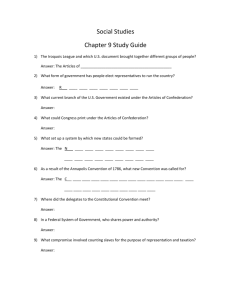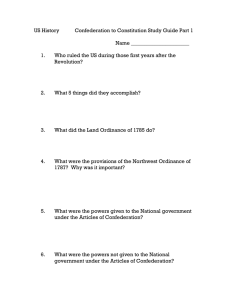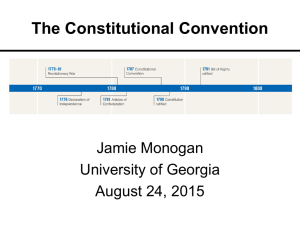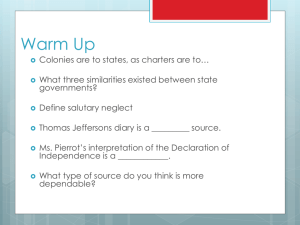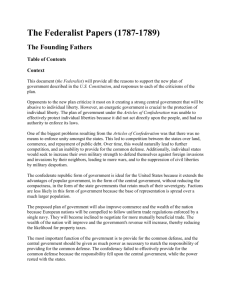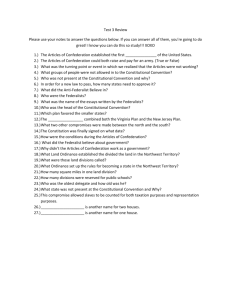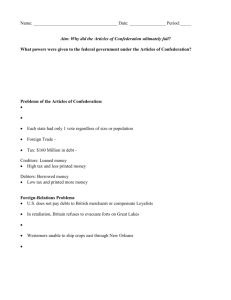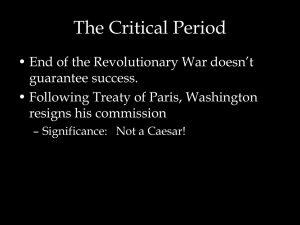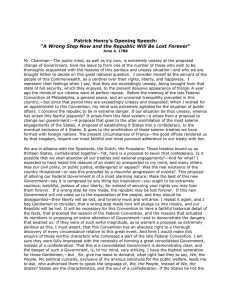IndependenceConfederationConvention
advertisement
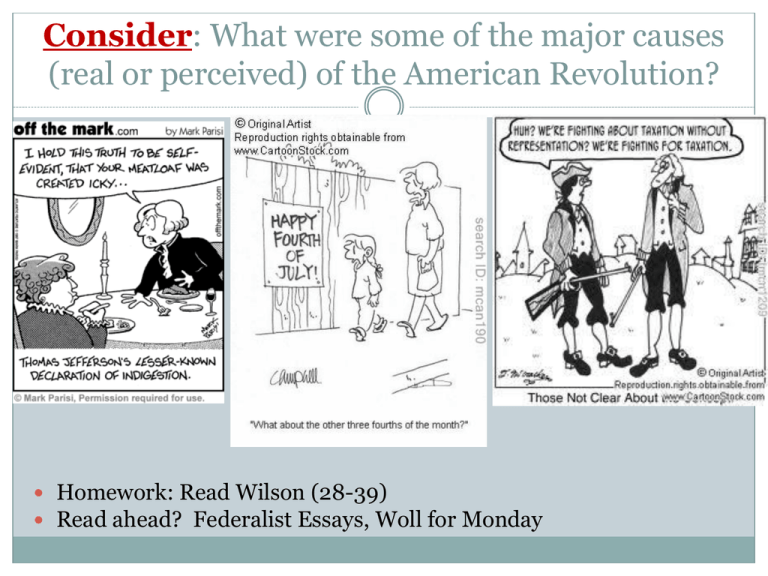
Consider: What were some of the major causes (real or perceived) of the American Revolution? Homework: Read Wilson (28-39) Read ahead? Federalist Essays, Woll for Monday Independence, Confederation, Convention THE ARTICLES OF CONFEDERATION AND THE FRAMERS’ DILEMMA AP GOVERNMENT AND POLITICS: CHAPTER 2 HOMEWORK: WILSON (28-39) Steps to the Constitution Declaration of Independence The Articles of Confederation The Mt. Vernon meeting The Annapolis Convention – the Lee Resolution The Declaration of Independence Section 2: Declaration of Natural Rights “We hold these truths to be self-evident, that all men are created equal, that they are endowed by their Creator with certain unalienable rights, that among these are life, liberty and the pursuit of happiness. That to secure these rights, governments are instituted among men, deriving their just powers from the consent of the governed. That whenever any form of government becomes destructive to these ends, it is the right of the people to alter or to abolish it, and to institute new government, laying its foundation on such principles and organizing its powers in such form, as to them shall seem most likely to effect their safety and happiness. Prudence, indeed, will dictate that governments long established should not be changed for light and transient causes; and accordingly all experience hath shown that mankind are more disposed to suffer, while evils are sufferable, than to right themselves by abolishing the forms to which they are accustomed. But when a long train of abuses and usurpations, pursuing invariably the same object evinces a design to reduce them under absolute despotism, it is their right, it is their duty, to throw off such government, and to provide new guards for their future security. – What elements of Locke’s philosophy are evident in this section? The Articles of Confederation - A plan for national government drafted in 1777to bring order to the nation - Fully went into effect in 1781 Describe the type of government that existed under the AoC. Branches of government Why/how did each of these aspects weaken the AoC? No ability to levy taxes or regulate commerce One vote in Congress for each state 9/13 votes needed for any measure, unanimity needed for amendments Delegates picked by state legislatures No national executive or judiciary All sovereignty and independence retained by states A Return to the Articles For these reasons, it has become accepted knowledge that the Articles of Confederation failed, and led to the adoption of a constitution which created a stronger central government… but some today contend that a return to this document might solve some of our current problems… The Dilemma At this point, what did many people in the United States realize? What was the dilemma that the Framers faced in trying to correct this problem? Madison, in Federalist 37… “It has been shown in these papers, …the existing Confederation is founded on principles which are fallacious; … It has been shown, that the other confederacies which could be consulted as precedents have been vitiated (reduced in value) by the same erroneous principles, and can therefore furnish no other light than that of beacons, which give warning of the course to be shunned, without pointing out that which ought to be pursued. The most that the convention could do in such a situation, was to avoid the errors suggested by the past experience of other countries, as well as of our own; and to provide a convenient mode of rectifying their own errors, … Among the difficulties encountered by the convention, a very important one must have lain in combining the requisite stability and energy in government, with the inviolable attention due to liberty and to the republican form.” Mindset of the Framers What was the mandate given to the delegates sent to Philadelphia in 1787? Why did they choose to exceed that mandate? Was this necessary? How might we have responded to the nature of the convention in today’s society? Did the Convention exceed its authority? How do you begin to answer such a question? If the Convention did exceed its authority, should it have anyway? Does it matter whether the Convention acted beyond the powers given to it?
